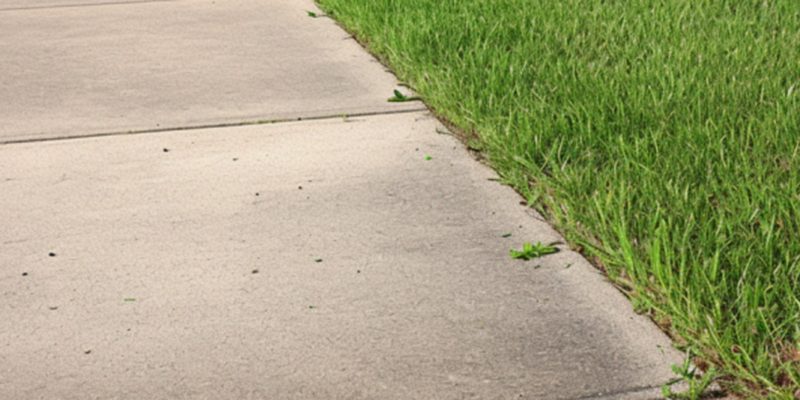Concrete sidewalks, a staple of urban and residential landscapes. In this post, we’ll delve into why the thickness of these sidewalks matters so much. From safety to durability, understanding sidewalk thickness is key to making informed decisions for your property in Des Moines, Iowa.
What is a Concrete Sidewalk?
A concrete sidewalk is more than just a path for foot traffic; it’s a crucial element in our urban and residential environments. Made from a mixture of cement, water, and aggregates like sand or gravel, these sidewalks provide a stable and durable surface for pedestrians.
In cities like Des Moines, concrete sidewalks serve a vital role. They connect neighborhoods, facilitate safe pedestrian movement, and contribute to the overall aesthetic of our communities. These walkways are designed to withstand years of use, facing everything from daily foot traffic to harsh Iowa winters.
When planning a concrete sidewalk, it’s essential to understand its makeup and purpose. This understanding guides decisions regarding construction and maintenance, ensuring that the sidewalks not only look good but also remain functional and safe for years to come.
Concrete Sidewalk vs. Concrete Walkway: Understanding the Difference
While often used interchangeably, there’s a subtle difference between concrete sidewalks and walkways. Sidewalks typically refer to paved paths alongside streets, primarily used for pedestrian traffic. In contrast, walkways might meander through gardens, parks, or private properties.
This distinction is crucial in understanding their construction and maintenance. Sidewalks in Des Moines are typically built to standardized specifications, considering factors like safety, city regulations, and durability against traffic and weather conditions. Walkways, on the other hand, might have more flexibility in design and thickness, catering to less frequent foot traffic and often integrating more personalized aesthetic elements.
Recognizing these differences helps homeowners and contractors make informed decisions about materials, design, and construction methods, ensuring that each type of path serves its intended purpose effectively.
Why Thickness Matters in Concrete Sidewalks
The thickness of a concrete sidewalk is not just a matter of quantity but a key factor in its overall quality and functionality. A sidewalk’s thickness directly impacts its ability to withstand various stresses, from the weight of pedestrians to environmental factors like ground movement and temperature fluctuations.
In Des Moines, where weather conditions can vary dramatically, the right sidewalk thickness ensures stability and longevity. A thicker sidewalk is less prone to cracking under the freeze-thaw cycles common in Iowa winters. It’s also more resilient against the wear and tear of daily use.
From a safety perspective, a well-constructed sidewalk with adequate thickness reduces the risk of uneven surfaces and potential tripping hazards. This is especially important in high-traffic areas where the safety of pedestrians is paramount.
Considering the right thickness is also a cost-effective approach in the long run. While a thicker sidewalk might require more material and initial investment, it pays off by minimizing the need for frequent repairs and maintenance.
In summary, the appropriate thickness of a concrete sidewalk is a balancing act. It must be thick enough to handle the demands of its environment and usage, yet efficiently constructed to remain cost-effective and practical for homeowners.
Factors Influencing Sidewalk Thickness
When determining the ideal thickness for a concrete sidewalk, several factors come into play. Two of the most significant considerations are the local climate and the expected traffic patterns.
Climate and Environmental Impact
In Des Moines, the climate plays a crucial role in sidewalk construction. The region experiences a range of weather conditions, from hot summers to cold, snowy winters. This variability means that sidewalks must be built to withstand a variety of environmental stresses.
During winter, the freeze-thaw cycle can be particularly harsh on concrete. Water seeps into cracks, freezes, and expands, potentially causing further damage. A thicker sidewalk can better resist these forces, reducing the likelihood of cracking and prolonging the lifespan of the walkway.
Additionally, in areas prone to heavy rainfall or flooding, a well-designed sidewalk helps manage water runoff, preventing erosion and maintaining structural integrity.
Traffic and Usage Patterns
Another key factor is the expected amount of foot traffic and the type of usage the sidewalk will see. In residential areas, sidewalks might primarily cater to pedestrians and light vehicles like bicycles. In these cases, a standard thickness is often sufficient.
However, if the sidewalk is expected to accommodate heavier loads, such as frequent foot traffic in commercial districts or occasional use by motorized vehicles (e.g., delivery carts, small utility vehicles), a thicker construction might be necessary to ensure durability.
For sidewalks near driveways or where they intersect with vehicular paths, reinforcing the concrete with a greater thickness or additional materials like rebar can provide extra support and resistance against the weight of vehicles.
Aesthetic and Design Preferences
While structural considerations are paramount, aesthetics also play a role in sidewalk thickness. Homeowners may opt for a certain thickness to achieve a specific look or to align with other landscaping elements. In such cases, the choice of thickness can contribute to the overall visual appeal of the property, complementing its design and enhancing curb appeal.
In conclusion, the ideal thickness of a concrete sidewalk in Des Moines depends on a combination of environmental factors, expected usage, and personal design preferences. By considering these aspects, homeowners and contractors can ensure that their sidewalks are not only functional and safe but also visually pleasing.
Common Questions About Concrete Sidewalks
Homeowners often have questions about installing and maintaining concrete sidewalks. Here are some common inquiries addressed with insights from industry knowledge.
What is the Ideal Thickness for a Concrete Sidewalk?
The standard thickness for residential sidewalks in Des Moines is typically 4 inches. This thickness is adequate to handle regular foot traffic and the local climate conditions. For areas with heavier usage or unique design requirements, the thickness may vary.
How Does Thickness Impact Cost?
While a thicker sidewalk might initially cost more due to the increased amount of materials and labor, it can be more economical in the long run. Thicker sidewalks tend to have a longer lifespan and require fewer repairs, offering better value over time.
What Maintenance is Required for Concrete Sidewalks?
Regular maintenance includes cleaning, sealing cracks, and occasionally resealing the surface to protect against weathering and wear. Timely repairs of small cracks and damages can prevent larger issues, ensuring the sidewalk remains safe and functional.
Can I Install a Concrete Sidewalk Myself?
While DIY installation is possible, professional installation is recommended. Professionals ensure the sidewalk is properly mixed, poured, and finished to meet local standards and longevity requirements. Expert concrete sidewalk installation can prevent common issues like uneven surfaces or premature cracking.
By understanding these aspects, homeowners can make informed decisions about their concrete sidewalks, ensuring they are well-equipped, functional, and aesthetically pleasing.
Additional Considerations in Sidewalk Construction
Beyond thickness, other construction elements play a vital role in the durability and functionality of concrete sidewalks.
Reinforcement Options
In some cases, additional reinforcement may be necessary. This can include steel bars (rebar) or wire mesh, which provide extra support and resistance to cracking under heavy loads. While these reinforcements can increase the initial cost and complexity of repairs, they significantly enhance the sidewalk’s strength, especially in areas with heavy traffic or where vehicles may occasionally pass over.
Expansion Joints and Their Importance
Expansion joints are crucial in climates like Des Moines, where temperature fluctuations are common. These joints allow the concrete to expand and contract without cracking. Properly placed expansion joints reduce stress on the concrete, extending the walkway’s life and maintaining its appearance and safety.
Sealants and Surface Protection
Sealing the concrete surface is a critical step in prolonging its lifespan. Sealants protect against moisture, reduce wear from foot traffic, and can enhance the sidewalk’s appearance. Depending on the chosen sealant, it can add different finishes to the sidewalk, contributing to the overall aesthetic of the property.
Incorporating these considerations into sidewalk construction not only ensures a long-lasting and safe path but also adds to the overall value and appeal of the property.
Conclusion
In conclusion, understanding the various factors that influence concrete sidewalk thickness is key to a successful installation. Whether you’re a homeowner in Des Moines looking to enhance your property or simply seeking information, this guide offers valuable insights into making informed decisions for a durable, safe, and aesthetically pleasing concrete sidewalk.
This comprehensive blog post offers a deep dive into the world of concrete sidewalk construction, covering everything from basic definitions to intricate construction details, tailored for homeowners in Des Moines, Iowa.

